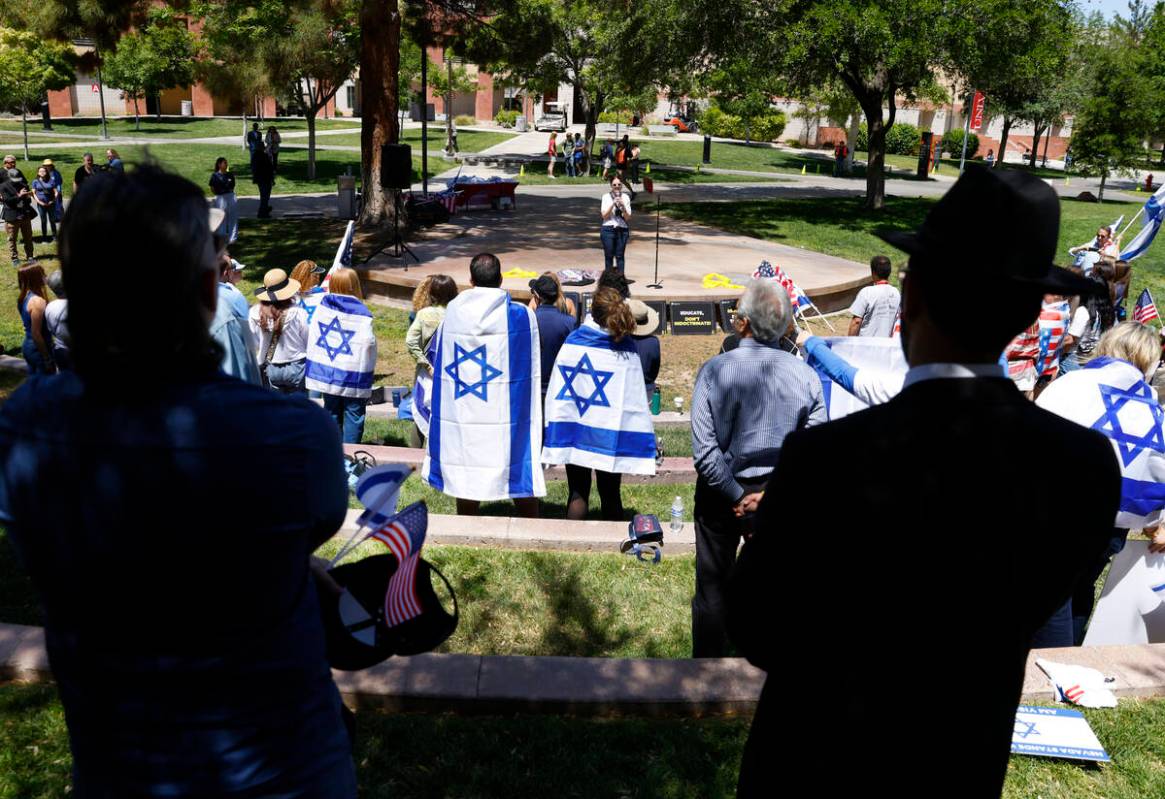COMMENTARY: Threatened and afraid

Three years ago, when I was in my freshman year at UNLV, I was elected student president of the campus chapter of Hillel, the main organization for Jewish students. I happily accepted my new position as I had expected to be in charge of planning social outings, welcome parties for new students and Jewish holiday events to foster a sense of community among Jewish students at UNLV. For two years, that’s what I did.
Since the Hamas terrorist attack on Israel on Oct. 7, however, my position has become more than I bargained for. Now, I’m being forced to become a political activist, to defend the right of myself and my peers to belong on campus. Our Jewish identity has been made political. As a result, we have needed to fight for our basic right to exist as UNLV students.
Just two days after the attack, Jewish students came together in front of the UNLV student union to express support for grieving Israelis and sing prayers for peace. During this event, several of my peers told me that they had been subject to harassment, yelled at, cursed and even spat upon. A few days later, we held a candlelight vigil to honor those who had lost their lives in the brutal acts of terrorism. It was a calm and peaceful event of prayers, heartfelt remarks of mourning and remembrance. That same week we hosted a support group for Israelis and others, to share how the events in Israel had impacted their everyday lives. These events occurred without any outreach or support from the UNLV administration. We did these for ourselves, for the validation of sharing our connection to and our solidarity with the diverse and vibrant people of Israel.
It was also a chance to share our difficult moments, as many had encountered hostility that generated feelings of insecurity and intimidation. This harassment of Jewish students compounded the anxiety of that terrible week, when Israel was still fighting to expel Hamas terrorists from its territory.
I remember those days and weeks as a time of confusion and guilt. How could I feel so afraid for myself here in Las Vegas? Why did I feel such a strong connection to Israel, a country that I had never visited? Why was I being put in a position of having to justify the right of Israelis to exist? Certainly none of our events had ever, nor have they since, questioned anyone else’s right to exist, including that of Palestinians.
Now, seven months later, I can acknowledge the reason that I was so afraid and anxious during this time and remain so to this day. I discussed at length with my family, friends and partner what would happen if Hamas and other terrorist factions achieved their goal of annihilating Israel. The answer cannot be said better than to quote Elie Wiesel: “I can live as a Jew outside Israel but not without Israel.”
As I’ve walked the campus of UNLV since Oct. 7, I have felt threatened and afraid due to my Jewish identity more times than I can count. I have explained to fellow students, faculty and senior administrators these feelings, such as my experience last November of being driven by anxiety to flee my Spanish class into the office of a trusted professor because of the chants performed by a large crowd calling for violence and destruction against the Israeli people. The student group that organized these provocations starting last fall has this spring affiliated with a national network, and its members have become bolder in their actions and rhetoric. They have disrupted academic events such as a lecture by an Israeli scientist and attacked, on social media and in their speeches, specific Jewish students as “racists” and “white supremacists” merely for acknowledging the systematic sexual assault and rape of Israeli women on Oct. 7.
Over the past seven months, a coalition of Jewish student leaders and faculty and staff have sought to bring forward these concerns to the university leadership. We have not sought to have anyone’s free speech curtailed, but we have asked the university to pursue de-escalation of the rhetoric and to promote education about the danger of anti-Jewish and Israel-phobic hate. We have reminded university leaders that harassment based on national origin or cultural heritage is judged not by the intent of the speaker but by the impact on those targeted. Our lived experience as Jewish students has been one in which the pervasive rhetoric has negatively impacted our education.
We have asked the university to fulfill its obligations under U.S. civil rights law, the Nevada System of Higher Education Code and common decency to respond to such rhetoric. We are still asking for that. These are the values of a university committed to diversity, and it is time for us at UNLV to live up to its ambitions.
Brooke Wingate, a UNLV senior,, is president of UNLV Hillel.